Film Name: 新愚公移山 / Xin Yu Gong Yi Shan
We’ve all heard the tale of Yu Gong Moving Mountains, and some of us even studied related lessons in school. But I can confidently say that the story told in this animated film, “Xin Yu Gong Yi Shan,” is not only one you’ve never seen before, but one you’ve likely never even heard of.
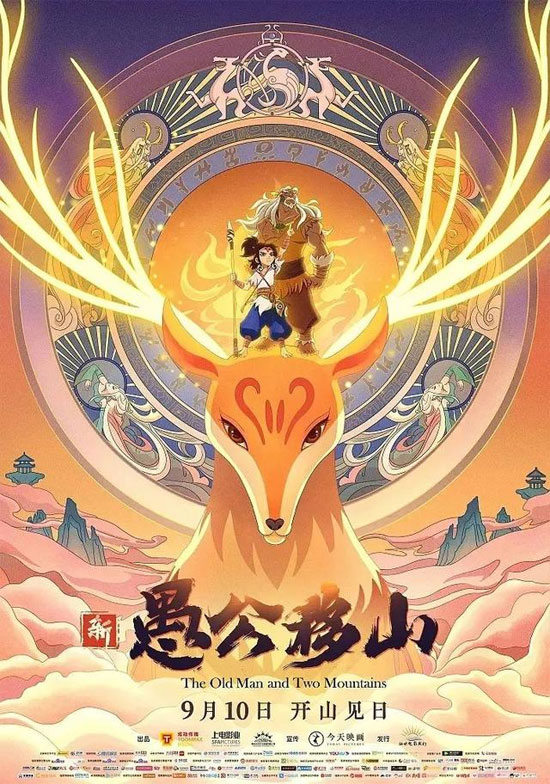
Scheduled for release on September 10th, this animated film is a pure 2D hand-drawn animation. In an era dominated by 3D and CG animations, such a purely 2D animated film is exceptionally rare and precious. What makes it even more “precious,” however, is its perspective. It reimagines the traditional and beloved mythological fable through a fresh lens, retaining the original essence while offering a reinterpretation and reworking. This transforms the classic tale into a new chapter that aligns with contemporary aesthetics.
“The Foolish Old Man Who Moved the Mountains” is a parable written by the Warring States philosopher Liezi, essentially a creation myth. Though brief, the tale unfolds with twists and turns, yet undeniably holds vast room for expansion and interpretation—such as the stories of the Foolish Old Man’s descendants, or the interplay between his mountain-digging and the mountain god’s mountain-moving. The perspective of “Xin Yu Gong Yi Shan” centers on Qingfeng, the son of Yu Gong. It tells the story of how father and son, united in their determination to move the mountains, work together to overcome challenges.
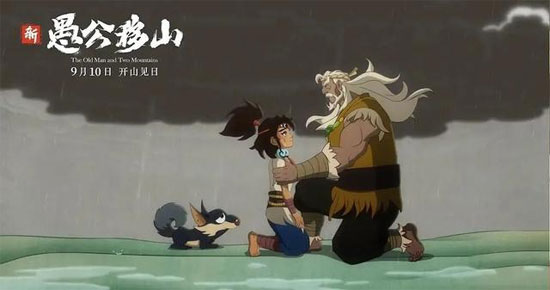
As a creation myth, the film significantly expands the worldview, introducing numerous mountain spirits and two mountain deities as new characters. This approach creates distinct narrative threads, presenting the actions of Yu Gong and his son through multiple perspectives—a reimagining of the original tale.
Take the renowned Wise Old Man, who opposes the mountain-digging endeavor. In the animation, his reasoning is more explicit: the ancestral teachings of the villagers at the mountain’s base state that the two great mountains are guarded by mountain spirits, and mortals must not rashly disturb the mountain deities. This justification is more substantial than in the original fable. Moreover, after surviving a sandstorm, this character undergoes a transformation when rescued by Yu Gong and Qingfeng, adding depth to his portrayal.
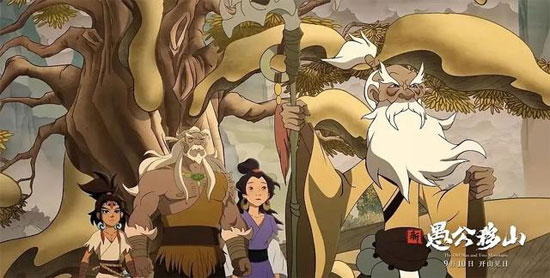
The other perspective belongs to the mountain deities. Yu Gong’s actions undoubtedly threatened their interests. Initially, they employed every means possible—including transforming mountain spirits into monsters to drive away the villagers and stirring up storms to force them to relocate through natural disasters. This represents another perspective—that of nature itself. In the original fable, Yu Gong’s actions, viewed objectively, were purely self-serving, disregarding the birds and beasts inhabiting the mountains. This highlights the conflict between humanity and nature.
Therefore, based on the above, Qingfeng, as the protagonist, becomes the breakthrough point for solving the “mountain-moving” dilemma through his actions.
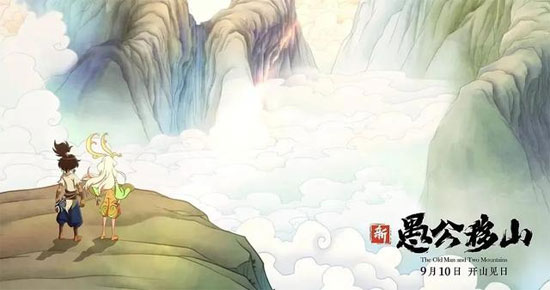
In the animation, Yugong’s son Qingfeng was born with exceptional wisdom, understanding that adversity breeds innovation. By chance, he came into contact with the mountain spirit Weiguang, and through mutual understanding, he learned to see things from the other’s perspective. Thus, he devised an alternative solution: relocate the mountain. For mortals, merely seeing the Mountain God was no easy feat, let alone persuading this guardian spirit—fierce and temperamental—to relinquish his domain. This task was as impossible as scaling the heavens. This very challenge became the film’s central spectacle, offering a second deconstruction of the story within the gap between Yu Gong’s digging and the mountain’s removal.
Whether facing natural disasters with unyielding resolve or battling monsters with heroic courage, the mountain villagers led by Qingfeng embodied the confidence and perseverance of ancient Chinese laborers. Even when the mountain spirit Weiguang was imprisoned by the mountain god for protecting humans, Qingfeng fearlessly climbed to the mountain god’s palace at an altitude of ten thousand meters to plead for mercy. All this underscores the truth that overcoming adversity demands unwavering persistence. And isn’t this very core the essence of the “Foolish Old Man Removes the Mountains” tale?

Ultimately, the mountain god was not only astonished by Yugong’s courage and perseverance but also moved by the mutual understanding and sacrifice between Yugong’s son and the mountain spirit. Yugong and the mountain god dissolved their mutual stubbornness and prejudices. Yugong ceased his mountain-digging, while the mountain god voluntarily moved the mountain away. Humans and mountain spirits transcended their own interests, willing to see from each other’s perspective to seek a coexistence solution. These new plot elements attempt to expand the traditional classic’s scope through a contemporary lens. “When the mountain in one’s heart vanishes, the mountain before one’s eyes moves.” Through courage, perseverance, and wisdom, humanity achieves harmonious coexistence with all of nature.
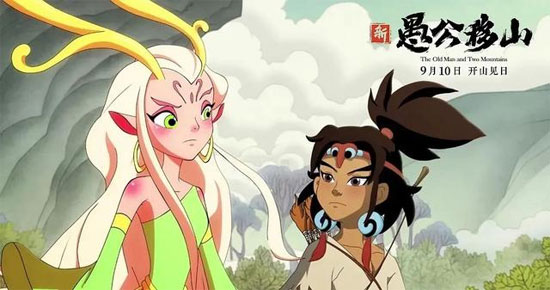
As a mythological animated film, “Xin Yu Gong Yi Shan” has a clearly defined core audience centered on children and young adults—a positioning that proves remarkably accurate. The film takes an ancient tale of perseverance in the face of hardship and expands it significantly, reimagining it through a lens that resonates with contemporary audiences. In this sense, it is unapologetically aimed at a child audience, a pure and straightforward work.
Yet its imaginative plot, charming original characters like Breeze and Glimmer, and the heartfelt vision of mutual respect and symbiosis between humanity and nature elevate it into a sincere and vibrant cinematic experience. Within its traditional hand-drawn 2D animation, the landscape-inspired ink-wash style radiates a distinctly Chinese aesthetic that leaves a lasting impression. “Xin Yu Gong Yi Shan” crafts this classic tale with such wit, ingenuity, and vividness that its approach consistently resonates in the children’s animation market.
Please specify:Anime Phone Cases » Xin Yu Gong Yi Shan 2020 Film Review: From digging mountains to moving mountains, it was only through such perseverance that the foolish old man finally moved the mountain god.